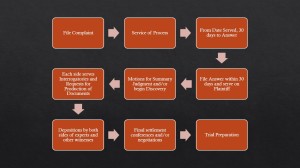 As I was about to drop the Complaint and Summons in the mail to the Sheriff for service, a light went off. NCS’ Registered Agent was listed as Joel Lackey, their CEO. NCS is headquartered in Atlanta, Georgia, presumably because that is where Lackey lives and he is the only owner of the company. You may be thinking, “and?” – but I was absolutely thrilled. Joel Lackey cannot be NCS’ Registered Agent in North Carolina – a company’s registered agent for a state has to live in that state.
As I was about to drop the Complaint and Summons in the mail to the Sheriff for service, a light went off. NCS’ Registered Agent was listed as Joel Lackey, their CEO. NCS is headquartered in Atlanta, Georgia, presumably because that is where Lackey lives and he is the only owner of the company. You may be thinking, “and?” – but I was absolutely thrilled. Joel Lackey cannot be NCS’ Registered Agent in North Carolina – a company’s registered agent for a state has to live in that state.
I had to check but I was certain there could be a major issue here. Service would continue to be problematic because their registered agent lives in another state. So what does one do in that situation? Well, you have to serve the Secretary of State. Having a registered agent – one that meets the requirements of the state – is the law; without one, a foreign corporation cannot receive a Certificate of Authority to practice business. And in North Carolina, without a Certificate of Authority, a collection agency cannot obtain the required license to collect debts. And collecting debts without that license in North Carolina is a Class I Felony.
I sent a letter to their contact at that point advising him that I intended to report them to the State at the time I serve the Secretary of State. And, I added, I was going to request the state administratively dissolve their Certificate of Authority – retroactively. It would, in turn, dissolve their collector’s license making their collection activity against me now criminal as well.
I sent the letter to them last Friday. On Tuesday, I received an email indicating they were sending me a check for my settlement demand by overnight mail. Case closed.
